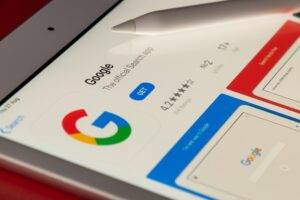In digital marketing, search engine optimisation (SEO) and pay-per-click (PPC) advertising are two of the most well-known strategies. They both increase your visibility in search results with the aim of driving traffic to your website.
In ecommerce, PPC drives direct sales. SEO is a slow burn with longevity. But which is right for your business? Really, you need both.
So, What is SEO?
When you type a search term into Google or another search engine, you get results – the SERP (search engine results page).
Search engine optimisation is a long-term strategy aimed at improving your website’s organic visibility in these SERPs. You optimise your website to rank higher for specific keywords that are relevant to your business. Ideally, you want to be on page one when a potential customer searches for a term that reflects your business.
SEO is known for its sustainability. Once your website achieves good organic rankings, you can enjoy consistent traffic over an extended period without the ongoing cost of clicks. That’s not to say you can leave it and forget about it, but as it’s harder work to get there, you stay longer.
Websites that appear in the top organic search results are often perceived as more credible and trustworthy by users. What’s more, most people won’t look beyond the first page, or even make the effort to scroll.
That’s the blessing and the curse. It requires continuous efforts in content creation, link building and on-page optimisation. High-quality and relevant content is the cornerstone of SEO. Regularly publishing valuable content can improve your rankings. Using a professional agency like these SEO services in Essex means you could get seen sooner, but is an investment that may take several months to deliver significant results
Effective SEO starts with thorough keyword research to identify the terms and phrases your target audience is searching for and creating content that matches their needs.
What About PPC?
PPC advertising also starts with keyword research.
PPC ads show at the top, bottom and side of SERPs. Instead of creating content that matches the search query (although good landing pages play a part in effective PPC) you bid on keywords. Depending on your budget and quality score, your aim is to get your ad to display as highly as possible.
Like SEO ranking, the higher positions get the most clicks. And while you pay each time someone clicks on your ad, you’d be looking to get the best cost to attain a customer, so you need to make sure those ads are converting.
You can experiment with different ad variations to find the most effective messaging for your target audience. But this is also automated, to help you get the best variations.
PPC can drive instant traffic to your website. As soon as your campaign is live, you start seeing results. And with PPC, you have precise control over your budget, ad copy and target audience. You can turn campaigns on or off at any time.
But these quick results can be costly, especially in competitive industries. You pay for each click, which can add up over time, especially if they’re not converting.
Which is the Right Strategy?
They both. And to be successful in business online, you need to win at both.
Are you looking for immediate leads and conversions, or are you more focused on building long-term authority and trust? If you have a limited budget and need quick results, PPC might be the right start. However, if you can invest in a long-term strategy, SEO offers long-term results.
PPC and SEO both benefit from well-optimised landing pages. A well-structured and user-friendly landing page can improve your Quality Score in PPC and enhance the user experience for organic visitors through SEO.
And what’s more, data and insights from PPC campaigns can provide valuable information for SEO. For example, you can learn which keywords generate the most conversions through PPC and then optimise your website for those keywords in your SEO strategy.
A/B testing in PPC can help refine ad copy and landing pages. The results can be applied to your SEO efforts to produce better messaging and a better user experience on your website.
Final Thoughts
TPPC is a quick and direct way to get attention on the internet by running ads that bring people to your website. You pay when someone clicks on your ad.
SEO is a long-term strategy. It’s about making your website show up on search engines in a natural way. It takes more time but can keep working for you over a longer period.
By using PPC and SEO together, you create strong online marketing that increases your website’s visibility, brings in more visitors and ideally turns them into customers.
Read more:
Is SEO or PPC the Right Strategy for Your Business?
















